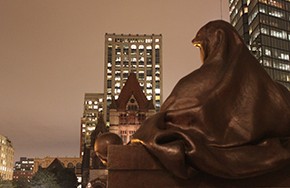Highly evolved questions: What scientists and theologians talk about

One story told widely by the New Atheists is that science deals with hard empirical facts on which rational choices can be based, while theology perpetuates superstitions, illusions and wishful thinking. Perhaps by way of reaction, other people insist that although science and theology have very different methods, they share a common commitment to building a body of knowledge through patient investigation that eventually gives access to reality (if somewhat different versions of it).
Both of these stories about science and theology understate the complexities that face any actual conversation between scientists and theologians—especially about what they are doing. We may indeed share a common commitment to truth, but we have such vastly different methods and starting points that it is hard to speak of a philosophy that we all share. We can learn important things from each other, but we are sometimes puzzled by how our colleagues work and how they know what they seem to know.
It’s too simple to suggest that there is one method for science and another for theology. Scientists themselves operate with vastly different methodologies. Some explore the paleoanthropological record, seeking clues to prehistoric life; others analyze particular practices among living communities; others identify cognitive mechanisms underlying religious beliefs as they surface in laboratory experiments; others generate theoretical models of human cooperation using mathematical analysis and equations.





